人教高中英语必修3 Unit2 Healthy eating Grammar课件(共25张PPT)
文档属性
| 名称 | 人教高中英语必修3 Unit2 Healthy eating Grammar课件(共25张PPT) |
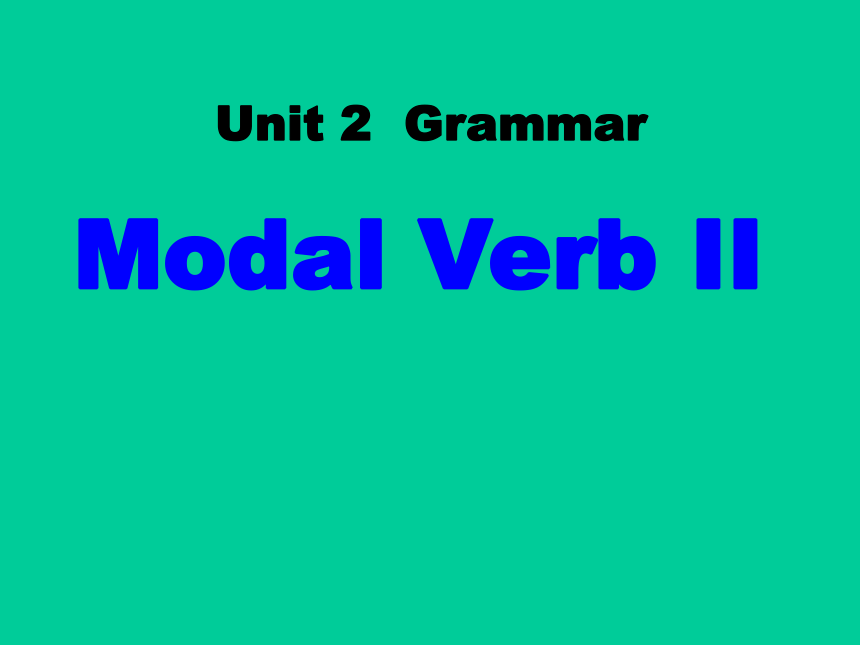
|
|
| 格式 | zip | ||
| 文件大小 | 730.0KB | ||
| 资源类型 | 教案 | ||
| 版本资源 | 人教版(新课程标准) | ||
| 科目 | 英语 | ||
| 更新时间 | 2020-03-03 21:13:20 | ||
图片预览

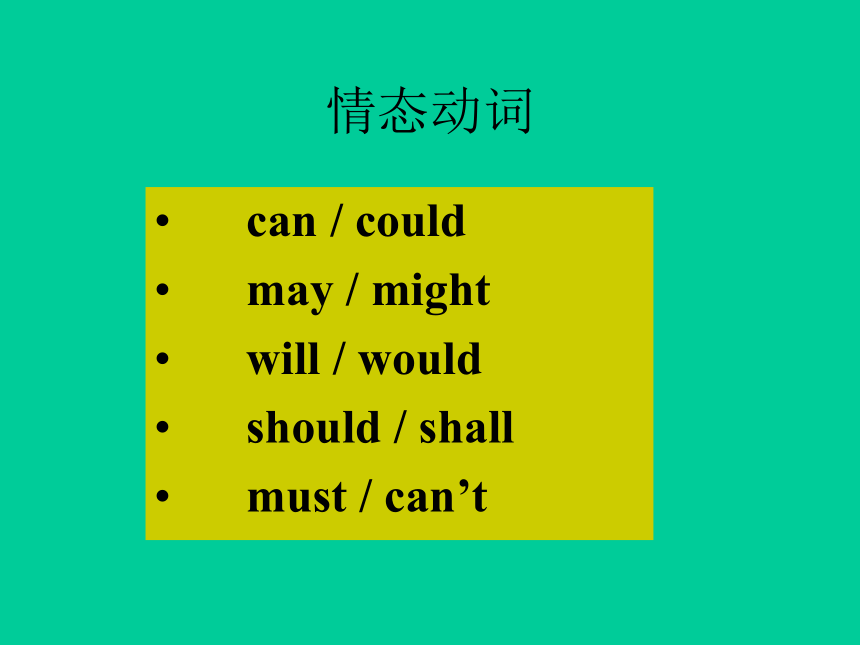
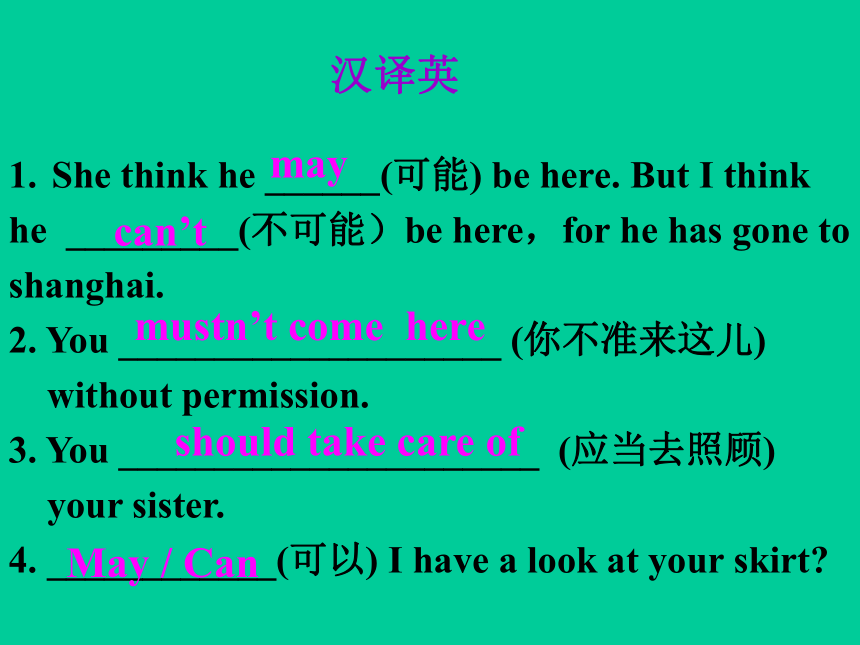

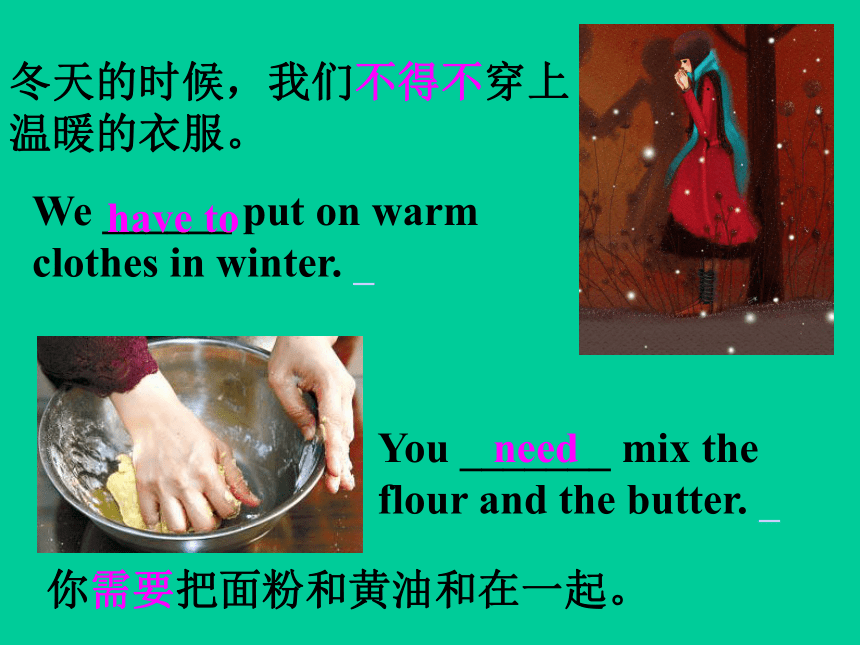
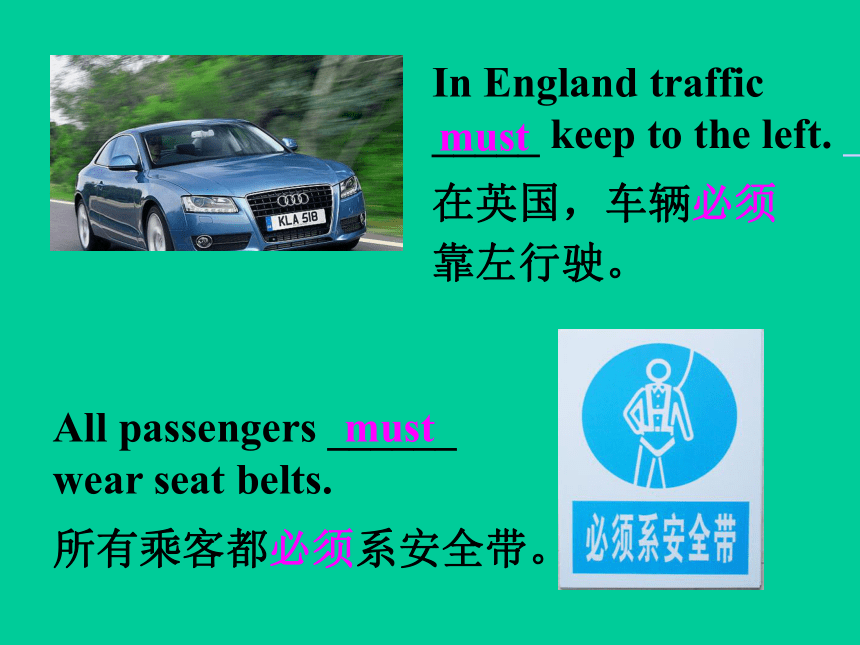
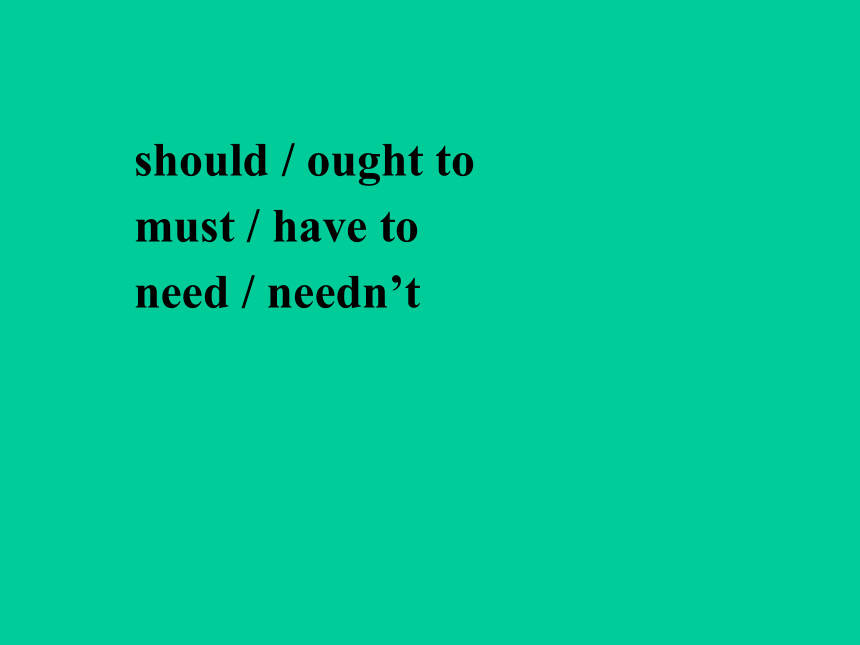
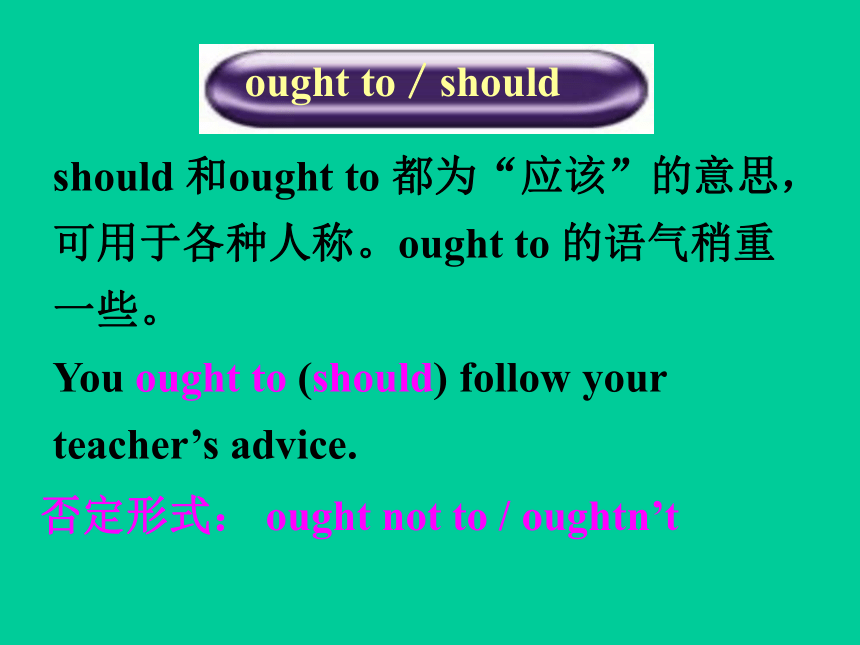
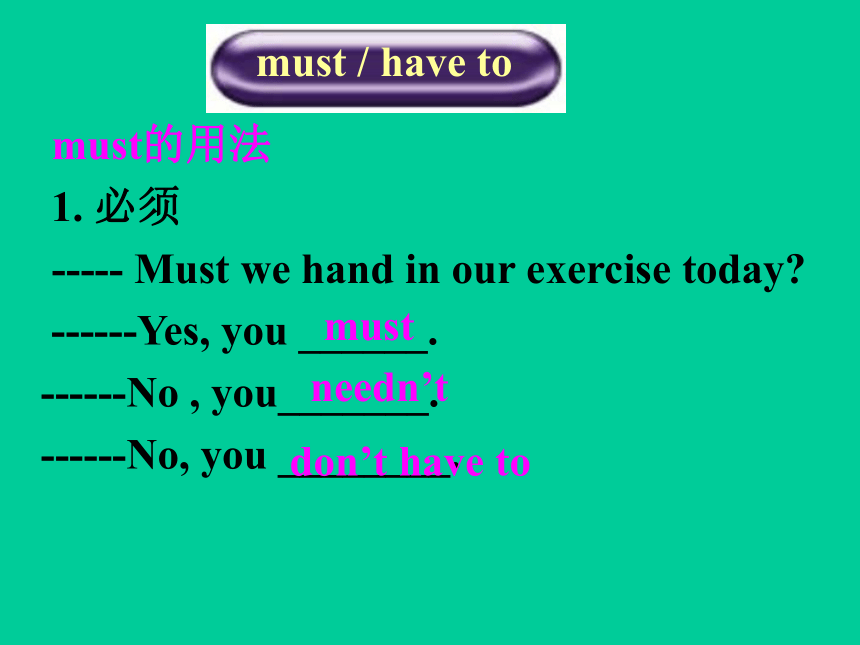
文档简介
(共25张PPT)
Modal Verb II
Unit 2 Grammar
情态动词
can / could
may / might
will / would
should / shall
must / can’t
?
She think he ______(可能) be here. But I think
he _________(不可能)be here,for he has gone to
shanghai.
2. You ____________________ (你不准来这儿)
without permission.
3. You ______________________ (应当去照顾)
your sister.
4. ____________(可以) I have a look at your skirt?
汉译英
may
can’t
should take care of
May / Can
mustn’t come here
I think she _______ apologise
to the public.
You ________ go and
see the doctor. ?
我认为她应该向公众道歉。
你应当去找医生看看病。
ought to
ought to
Fill in the blanks according to the Chinese.
We ______ put on warm
clothes in winter. ?
冬天的时候,我们不得不穿上
温暖的衣服。
你需要把面粉和黄油和在一起。
You _______ mix the
flour and the butter. ?
have to
need
In England traffic
_____ keep to the left. ?
在英国,车辆必须
靠左行驶。
All passengers ______
wear seat belts.
所有乘客都必须系安全带。
must
must
should / ought to
must / have to
need / needn’t
should 和ought to 都为“应该”的意思,
可用于各种人称。ought to 的语气稍重
一些。
You ought to (should) follow your
teacher’s advice.
否定形式: ought not to / oughtn’t
must的用法?
1. 必须
----- Must we hand in our exercise today?
------Yes, you ______.
------No , you_______.
------No, you ________.
must
needn’t
don’t have to
have?to?的用法?
1. must表示一种主观的需要,意思是“必须” 无时态变化。
2. have?to表示一种客观的需要,意思是“不得不”。有时态变化。
否定形式: don’t have to
it is late, I _____go home.
my mother call me hurriedly, I ____ go home.
have to
must
注意对need问句的回答:
--Need I finish the work today?
--Yes, ________________.
No, ________________.
No, ________________.
you must
you needn’t
you don’t have to
needn’t 对其它情态动词的回答:
--Shall I tell John about it?
--No, you _____________________.
--Must we do it now?
--No, you _____________________.
needn’t (don’t have to)
needn’t (don’t have to)
在不表示推测的情态动词中, 我们要注意以下方面的问题:
1. 表示能力、许可的情态动词的用法。
2. 表示否定的情态动词的用法。
3. shall和will的多种意义的区别。
4. 情态动词短语的使用。
5. 虚拟语气中情态动词的使用。
表示能力: can, could, be able to
be able to 能用于各种时态。
can / could 只能表示现在或过去的能力。
was / were able to 成功做成某事
相当于 managed to do sth.
succeeded in doing sth.
1. 表示能力、许可的情态动词的用法。
表示许可: may / might, can / could
might, could 比较委婉, 一般多用于疑
问句。
can, may 表达的语言比较随便。
在以could, might 表示征询对方意见
或表示请求时,回答应相应使用can,
may。
2. 表示否定的情态动词的用法:
mustn’t 不准; 禁止
needn’t 没必要 ( = don’t have to )
can’t 不能; 不可能
may not 不可以; 可能不
shouldn’t 不应该 ( = ought not to )
部分情态动词的否定式是情态动词中的考点之一。
不同的“肯定”程度可按下列层次排列:
He is at home. (事实)
He must be at home. (非常肯定的推断)
He should/ought to be at home. (很可能)
He may/might be at home. (仅仅可能而已)
He couldn’t /can’t be at home. (很可能不在家)
He isn't at home. (事实)
3. 情态动词shall, will 的多种意义:
shall / will+ 动词原形:
shall 可表示必须、命令、警告或征询意见。
will 可表示意愿、常出现的动作、在疑问句中表示请求和建议。
均可表示将来。 过去时为 should, would。
4. 情态动词短语的使用:
would like to do… would rather do…
would rather + 从句 would prefer to do...
had better do...
5. 用于虚拟语气的情态动词:
should might could would needn’t ought to
1. Where is my pen? I ______ it.
A. might lose B. would have lost
C. should have lost D. must have lost
2. I didn’t hear the phone. I _____ asleep.
A. must be B. must have been
C. should be D. should have been
课堂练兵
3. Ted, you _____ play with the knife.
You ______ hurt yourself.
A. don’t have to; must B. mustn’t; may
C. needn’t; can D. oughtn’t to; have to
4. — Must he come to apologize to you
himself?
— Yes, he ______.
A. can B. must
C. may D. need
5. You ______ read the text this evening
if you don’t want to.
A. may not B. can’t
C. needn’t D. mustn’t
6. — I don’t mind telling you what I know.
— You ______. I’m not asking you for it.
A. mustn’t B. may not
C. can’t D. needn’t
7. — Must I take a taxi to go to the Summer
Palace?
— No, you ______. You can walk there.
A. can’t B. don’t have to
C. mustn’t D. ought not to
8. — ______ I buy some eggs in the
supermarket?
— No, you ______. I have bought some
yesterday.
A. Shall; shan’t B. Must; mustn’t
C. Shall; needn’t D. Can; can’t
?
I _______________ (得接受) your
suggestion.
2. You _________________ (你不能来这儿)
without permission.
3. You _________________ (应当去照顾)
your sister.
4. I think you _________________ (应当去
看) the doctor.
汉译英
have to accept
mustn’t come here
should take care of
ought to go to see
5. The teacher told the students that they
____________________________________
(不应该在课堂上沉默不语) all the time.
6. You ______________________ (就得不到
我的支持) if you do such a thing.
7. — I waited for the train for two hours at
the station this morning.
— Well, you ________________________
(本来没有必要去那么早的).
8. “You _____________________ (你千万不
要再喝酒了),” the doctor warned him.
mustn’t drink any more
ought not to / shouldn’t keep silent in class
shall not get my support
needn’t have set off so early
Modal Verb II
Unit 2 Grammar
情态动词
can / could
may / might
will / would
should / shall
must / can’t
?
She think he ______(可能) be here. But I think
he _________(不可能)be here,for he has gone to
shanghai.
2. You ____________________ (你不准来这儿)
without permission.
3. You ______________________ (应当去照顾)
your sister.
4. ____________(可以) I have a look at your skirt?
汉译英
may
can’t
should take care of
May / Can
mustn’t come here
I think she _______ apologise
to the public.
You ________ go and
see the doctor. ?
我认为她应该向公众道歉。
你应当去找医生看看病。
ought to
ought to
Fill in the blanks according to the Chinese.
We ______ put on warm
clothes in winter. ?
冬天的时候,我们不得不穿上
温暖的衣服。
你需要把面粉和黄油和在一起。
You _______ mix the
flour and the butter. ?
have to
need
In England traffic
_____ keep to the left. ?
在英国,车辆必须
靠左行驶。
All passengers ______
wear seat belts.
所有乘客都必须系安全带。
must
must
should / ought to
must / have to
need / needn’t
should 和ought to 都为“应该”的意思,
可用于各种人称。ought to 的语气稍重
一些。
You ought to (should) follow your
teacher’s advice.
否定形式: ought not to / oughtn’t
must的用法?
1. 必须
----- Must we hand in our exercise today?
------Yes, you ______.
------No , you_______.
------No, you ________.
must
needn’t
don’t have to
have?to?的用法?
1. must表示一种主观的需要,意思是“必须” 无时态变化。
2. have?to表示一种客观的需要,意思是“不得不”。有时态变化。
否定形式: don’t have to
it is late, I _____go home.
my mother call me hurriedly, I ____ go home.
have to
must
注意对need问句的回答:
--Need I finish the work today?
--Yes, ________________.
No, ________________.
No, ________________.
you must
you needn’t
you don’t have to
needn’t 对其它情态动词的回答:
--Shall I tell John about it?
--No, you _____________________.
--Must we do it now?
--No, you _____________________.
needn’t (don’t have to)
needn’t (don’t have to)
在不表示推测的情态动词中, 我们要注意以下方面的问题:
1. 表示能力、许可的情态动词的用法。
2. 表示否定的情态动词的用法。
3. shall和will的多种意义的区别。
4. 情态动词短语的使用。
5. 虚拟语气中情态动词的使用。
表示能力: can, could, be able to
be able to 能用于各种时态。
can / could 只能表示现在或过去的能力。
was / were able to 成功做成某事
相当于 managed to do sth.
succeeded in doing sth.
1. 表示能力、许可的情态动词的用法。
表示许可: may / might, can / could
might, could 比较委婉, 一般多用于疑
问句。
can, may 表达的语言比较随便。
在以could, might 表示征询对方意见
或表示请求时,回答应相应使用can,
may。
2. 表示否定的情态动词的用法:
mustn’t 不准; 禁止
needn’t 没必要 ( = don’t have to )
can’t 不能; 不可能
may not 不可以; 可能不
shouldn’t 不应该 ( = ought not to )
部分情态动词的否定式是情态动词中的考点之一。
不同的“肯定”程度可按下列层次排列:
He is at home. (事实)
He must be at home. (非常肯定的推断)
He should/ought to be at home. (很可能)
He may/might be at home. (仅仅可能而已)
He couldn’t /can’t be at home. (很可能不在家)
He isn't at home. (事实)
3. 情态动词shall, will 的多种意义:
shall / will+ 动词原形:
shall 可表示必须、命令、警告或征询意见。
will 可表示意愿、常出现的动作、在疑问句中表示请求和建议。
均可表示将来。 过去时为 should, would。
4. 情态动词短语的使用:
would like to do… would rather do…
would rather + 从句 would prefer to do...
had better do...
5. 用于虚拟语气的情态动词:
should might could would needn’t ought to
1. Where is my pen? I ______ it.
A. might lose B. would have lost
C. should have lost D. must have lost
2. I didn’t hear the phone. I _____ asleep.
A. must be B. must have been
C. should be D. should have been
课堂练兵
3. Ted, you _____ play with the knife.
You ______ hurt yourself.
A. don’t have to; must B. mustn’t; may
C. needn’t; can D. oughtn’t to; have to
4. — Must he come to apologize to you
himself?
— Yes, he ______.
A. can B. must
C. may D. need
5. You ______ read the text this evening
if you don’t want to.
A. may not B. can’t
C. needn’t D. mustn’t
6. — I don’t mind telling you what I know.
— You ______. I’m not asking you for it.
A. mustn’t B. may not
C. can’t D. needn’t
7. — Must I take a taxi to go to the Summer
Palace?
— No, you ______. You can walk there.
A. can’t B. don’t have to
C. mustn’t D. ought not to
8. — ______ I buy some eggs in the
supermarket?
— No, you ______. I have bought some
yesterday.
A. Shall; shan’t B. Must; mustn’t
C. Shall; needn’t D. Can; can’t
?
I _______________ (得接受) your
suggestion.
2. You _________________ (你不能来这儿)
without permission.
3. You _________________ (应当去照顾)
your sister.
4. I think you _________________ (应当去
看) the doctor.
汉译英
have to accept
mustn’t come here
should take care of
ought to go to see
5. The teacher told the students that they
____________________________________
(不应该在课堂上沉默不语) all the time.
6. You ______________________ (就得不到
我的支持) if you do such a thing.
7. — I waited for the train for two hours at
the station this morning.
— Well, you ________________________
(本来没有必要去那么早的).
8. “You _____________________ (你千万不
要再喝酒了),” the doctor warned him.
mustn’t drink any more
ought not to / shouldn’t keep silent in class
shall not get my support
needn’t have set off so early
同课章节目录
